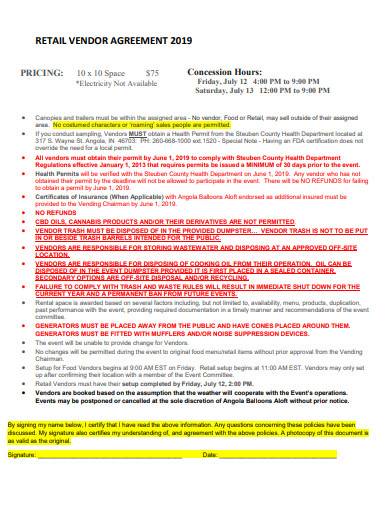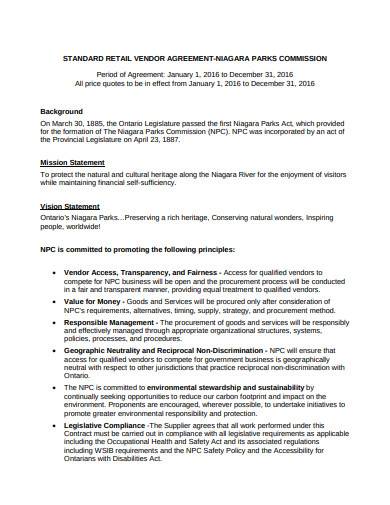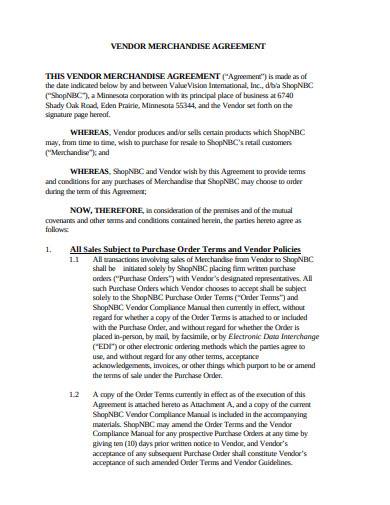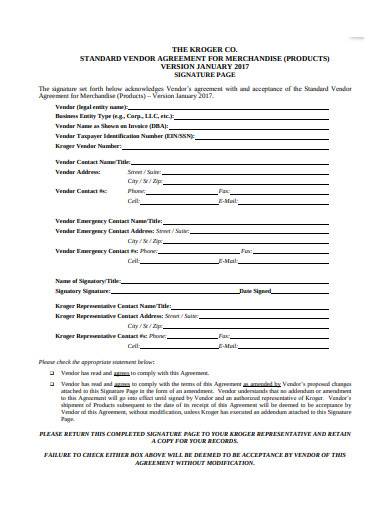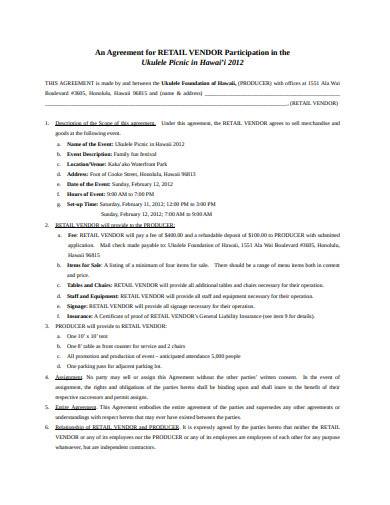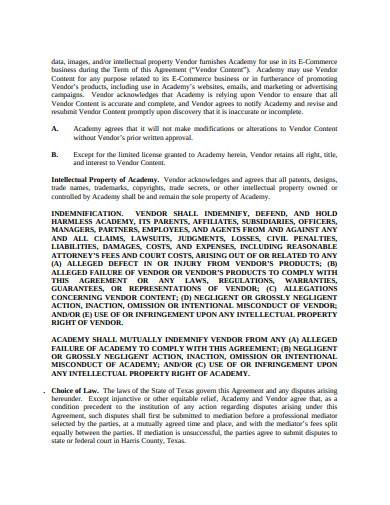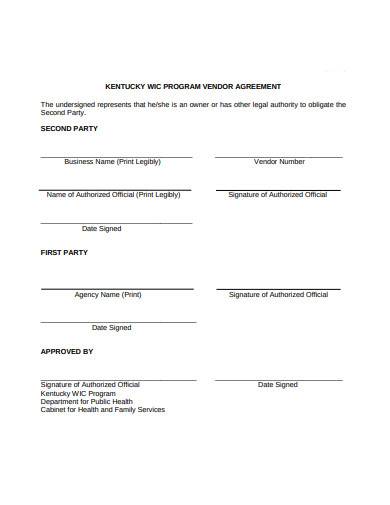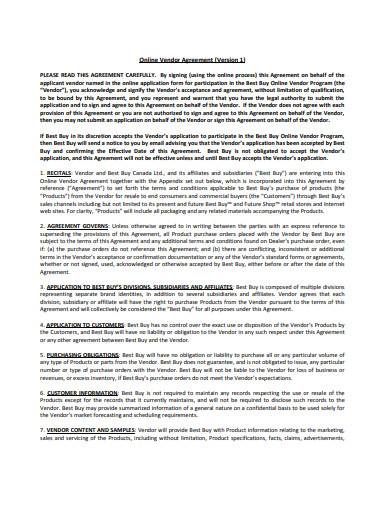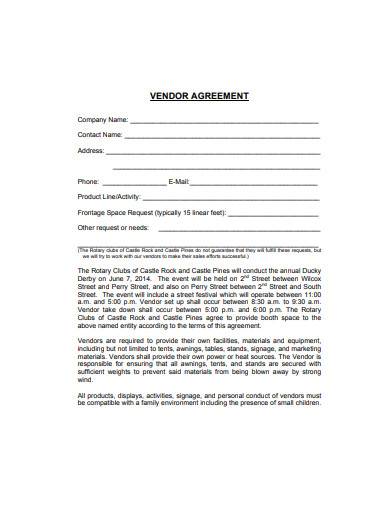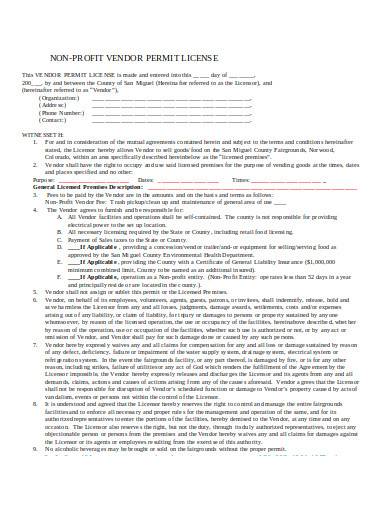Retail business, for most people, is simply defined as the selling goods and services to people in smaller quantities. From the generally cute lemonade stands of neighborhood children to the bigger players of the industry; supermarkets, retail is vital to the everyday lives of many individuals all over the world. As such, as the forefronts of modern-day commodity acquisition, legal boundaries and contract agreements must be established for these titans of commerce.
What is a Retail Vendor Agreement?
In the competitive hierarchy known as business marketing, “trust” is such a difficult concept to handle. It’s either too expensive a commodity to give or too asinine a decision to make without validity as it greatly impacts your business. Ironically, without “trusting” your business partners, your employees, or your dealers, your corporation will die sooner than a moth drawn to a flame. To combat this, entrepreneurs have introduced the concept of legal contracts to document financial transactions.
Though categorized by many as a smaller part of business, the enterprise values of various retail businesses should not be underestimated. With such revenue in a relatively inconspicuous setting, setting legal boundaries is all the more important to retail. One such document often used in this manner is a retail vendor agreement. Barring a few specifics within the retail industry, a vendor agreement uses the same format for the most part. Furthermore, this form of legal bondage is common among the commerce industry—so knowledge on how to draft one proves beneficial in advancing your business.
Retailed Consent
Through out social media, television, and news articles, there is no word with as much of a resounding impact as that of the word “consent.” Commonly associated with legal matters and approval of actions, consent plays a vital role in multiple aspects of business. These range from the formation of partnerships to court cases and lawsuits. However, a form of consent that very few people know about but give at least once a day is that of purchasing retail goods. Basically speaking, when you buy products at a retail store, you understand the potential risks and harms that come with your purchase and still proceed to the counter. Once you have the receipt, you’ve basically sealed the deal. How is this relevant? Simply put, legal documents specialize in handling with these matters, but businesses and franchises are quite adept at retailing consent.
10+ Retail Vendor Agreement Samples in PDF | DOC
1. Retail Vendor Agreement Sample
2. Standard Retail Vendor Agreement Template
3. Retail Merchandise Vendor Agreement in PDF
4. Standard Retail Vendor Agreement Example
5. Formal Retail Vendor Agreement Template
6. Non Retail Vendor Agreement Sample
7. Retail E Comers Vendor Agreement Template
8. Basic Retail Vendor Agreement Sample
9. Online Retail Vendor Agreement in PDF
10. General Retail Vendor Agreement Template
11. Retail Vendor Agreement in DOC
How to Draft a Retail Vendor Agreement
Retail vendor agreements are, for all intents and purposes, used as legal bindings for transactions. As such, the text found within must be precise, understandable, and legally hefty. To help you out in drafting your retail vendor agreement, here are a few tips and tricks you can use to get started.
1. Establish Boundaries
Establishing boundaries is the most challenging aspect of drafting your retail vendor agreement. Though sitting down and writing terms and conditions seems easy on paper, the amount of pressure that comes with writing indisputable conditions is the hard part. The terms and conditions define the entire agreement and transaction. It’s this part of the document that sets the tone of the transaction’s nature, so it’s best to secure this part first.
2. Use Clear Language
One of the thing that bring down any retail vendor agreement is lack of understandable words. What happens is either the other party does not sign the contract because they didn’t understand it or the lack of comprehensiveness is what brings you to a loosing court case. As much as possible, keep your words simple and clear to avoid any of the dilemmas presented above.
3. Stick to the Format
What does asset purchasing, a payment plan, commissions, resellers, distribution, and commercial purchasing all have in common? The contract agreements used to legalize these terms follows a strict format: they require you to provide conditions, exchange goods and services of value, and provides reprimendations of actions contradicting to the deal. Your retail vendor agreement serves the same function as the examples mentioned above; hence, they should be no different from each other.
4. Provide a Space for Signatories
Commonly seen—yet highly underappreciated—on all forms of media is its signing. While many people understand the fact that this is a necessary step to the document’ solidification, few people understand the invalidity of a contract without it. If even a minute detail of both parties is incorrect, disputes at court become heavily-favored to the person who wasn’t correctly indicated on the signatory. Hence, make sure to do your research and properly address all partie involved in the transaction.
Retail vendor agreements—and business transactions in general—play a vital role in securing various enterprises. Without these glorious sheets of paper, the likelihood of getting scammed or bamboozled increases. As such, whether it’s finding a new business partner, preventing an allied company from revealing your business secrets, or retailing consent, legally securing yourself and your brand drastically extends its lifespan.
Related Posts
FREE 10+ Cash Management Agreement Samples in PDF | DOC
FREE 10+ Joint Management Agreement Samples in DOC | PDF
FREE 4+ Fleet Management Agreement Samples in PDF
FREE 3+ Event Management Agreement Samples in PDF | DOC
FREE 10+ Performance Management Agreement Samples in PDF | DOC
FREE 3+ Restaurant Management Agreement Samples in PDF | DOC
FREE 5+ Fund Management Agreement Samples in PDF | DOC
FREE 3+ Farm Management Agreement Samples in DOC | PDF
FREE 5+ Collateral Management Agreement in PDF | DOC
FREE 9+ Project Management Agreement Samples in DOC | PDF
FREE 6+ Case Management Agreement Samples in PDF | DOC
FREE 10+ Exclusive Management Agreement Samples in PDF | DOC
FREE 8+ Forest Management Agreement Samples in DOC | PDF
FREE 6+ Discretionary Management Agreement Samples in PDF
4+ Energy Management Agreement Samples in DOC | PDF

